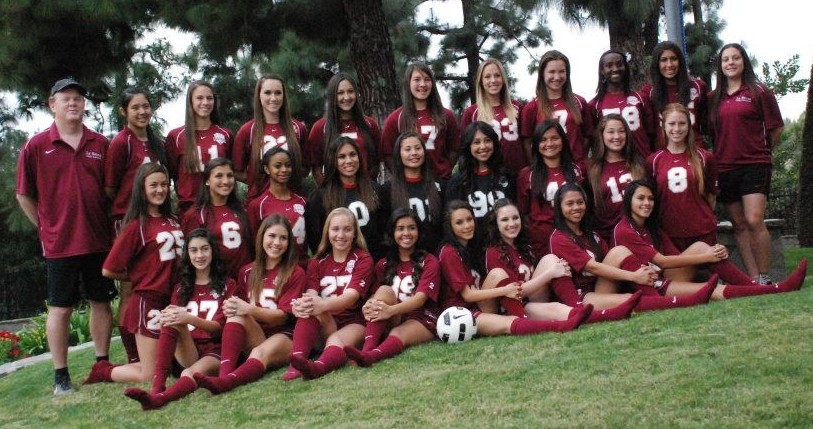SoccerToday’s Women In Soccer Series
Women’s Soccer News: Tessa Troglia is a prominent youth soccer coach — working with Cal South‘s Coaching Education Program and helping train the next generation of women soccer players. Troglia — a former player herself, is paying it forward and giving back to the game of soccer. Troglia attended La Serna High School in Whittier, CA where she is now the Girls Varsity Head Coach. In 2008 and 2013 her teams went undefeated in the league and clinched the CIF Championship.
 In addition to coaching at La Serna, Troglia is the CDA Slammers Director, a Cal South Coaching Education Instructor and head coach of the East Los Angeles Women’s Soccer Team, Nevada ODP 02′, G13 Black, G13White and G15 CDA Slammers. Troglia’s history as a player includes: Cal State LA, F.C. Girona (Division I Women’s Professional Team in Spain) and the Women’s Premiere Soccer League (Rampage and LAFC).
In addition to coaching at La Serna, Troglia is the CDA Slammers Director, a Cal South Coaching Education Instructor and head coach of the East Los Angeles Women’s Soccer Team, Nevada ODP 02′, G13 Black, G13White and G15 CDA Slammers. Troglia’s history as a player includes: Cal State LA, F.C. Girona (Division I Women’s Professional Team in Spain) and the Women’s Premiere Soccer League (Rampage and LAFC).
SoccerToday recently interviewed Tessa Troglia, to get her feedback on Women In Soccer, what has made her successful and how she manages so many teams.
 Andrea Garcia: When did you first start coaching youth soccer?
Andrea Garcia: When did you first start coaching youth soccer?
Tessa Troglia: I first started coaching soccer in 2002, the year after I graduated high school. I returned to my high school varsity team at La Serna High School in Whittier as an Assistant Coach.
Andrea Garcia: What inspires you to be a soccer coach?
Tessa Troglia: I’m inspired by the women in my life, who statistically should have failed.
The qualities they possessed in order to overcome the trials and tribulations in their life, and their ability to hold their head high and never gave up despite the myriad of obstacles in their way. The world of competitive coaching could be very cut throat, and to be acknowledged as a successful female coach inspires me to help young female athletes identify their strengths as players and individuals.
Andrea Garcia: Why do you think there are so few women coaches?
Tessa Troglia: I think female coaches who consider coaching as a career are aware of the challenges and the odds against them. If you look at some of the well-known Youth Soccer Clubs in any area, the ratio of female to male coaches are roughly 1-10. Unfortunately, there are many male coaches and directors who truly feel that coaching is a “man’s job.”
Andrea Garcia: Do you think there are fundamental differences between male and female coaches?
Tessa Troglia: I do not. Maybe women are perceived to handle situations from an emotional standpoint and men more logical; one of the many stereotypes of female vs male coaches.
 Andrea Garcia: Why is it tough to be a female coach?
Andrea Garcia: Why is it tough to be a female coach?
Tessa Troglia: Recognition. It is tough to be a female coach because even when you have attained a level of success, there is always someone trying to take that from you. I think women, like most people, like to feel appreciated and accomplished especially having been able to defy the odds. Unfortunately those feelings never really resonate, the pressures of upholding your reputation requires constant movement in your career and consistent results.
Andrea Garcia: What traits does an female coach need to survive and thrive?
Tessa Troglia: To survive and thrive as a female coach means to endure! You have to have thick skin.
To make it as a female coach you may have to endure heart break when a team is taken from you and given to another coach. You might have to endure defeat, when you worked so hard to take on a new position or role, and learn that someone less qualified got the position.
People have told me I would never be able to make a living off of coaching soccer and I would never be able to change a struggling collegiate program. You have to surround yourself with people who want you to succeed and lead you in the right direction, and continue to learn from those people and coaches who have made an impact in the coaching world.
Andrea Garcia: How important do you think it is to have the same sex coach?
Tessa Troglia: I do think there are many benefits of having a strong female coach coaching young females. I think some male coaches constantly struggle with the right balance of how to treat young female athletes. I also think there are always those young girls that look to take advantage of male coaches in different aspects. Female coaches don’t necessarily have to consider an appropriate approach, I think it is a more natural interaction; especially coaches who have played competitively. Women coaches can also be tougher on their players; excuses that may work on male coaches most certainly will not work on females.
 Andrea Garcia: Who do you think is the best female coach in the world?
Andrea Garcia: Who do you think is the best female coach in the world?
Tessa Troglia: Jill Ellis, evidenced by her new role as the U.S. Women’s National Team Head Coach and her accomplishments throughout her stellar career.
Andrea Garcia: What needs to change in order for more female coaches to make it?
Tessa Troglia: They need more resources after completing coaching courses. Organizations in their area who are willing to offer these women an opportunity. These organizations need to provide a healthy and positive environment, that in turn can offer guidance, feedback, and resources that will aid in the development of effective female coaches.
Andrea Garcia: What do you think about the state of girls soccer?
Tessa Troglia: It has changed drastically over the last 10 years, for the worse to be quite frank.
Gone are the days when girls had to play in male leagues because female clubs did not exist or were too far to drive to. Girls had to prove that they can play with the boys and fought for their right to be on that field everyday.
The power of “choice” these days has been abused by many. Too many parents placing blame on coaches for their child’s lack of success, and they bounce around from club to club, never teaching their child accountability. Then there are the selfish coaches who hold players back just so they can have a star on the team to win games, robbing those individuals from reaching their full potential by playing at a higher level.
Lastly, the most recent trend of the acquisition of small clubs by bigger clubs for the sole purpose of money without any regard to the development and direction of these new teams and players. Of course this does not apply to every kid or the clubs like Slammers who have stellar reputations.
 Andrea Garcia: You are involved with so many teams. Is it hard to balance personal and work life?
Andrea Garcia: You are involved with so many teams. Is it hard to balance personal and work life?
Tessa Troglia: As a collegiate coach, club director, high school coach, and youth soccer coach, it is quite the struggle to balance my personal life and work. I definitely could not do it alone, I have exceptional help with the high school and club teams, but even with assistant coaches it can all be very overwhelming. Luckily, there’s really only a three-week overlap with the high school and college, and club practices are in the evening. When I work with the ODP teams, it’s usually a week at a time, for maybe four weeks total out of the year, so I make it work. I wouldn’t change it for anything.
Andrea Garcia: If you could turn the clock back, what advice would you give yourself?
Tessa Troglia: The advice I would give myself at the age of twenty is, “your going to get knocked down hard, but you will get back up, learn from your mistakes and don’t dwell so much on your failures. It is only because of these failures you were able to achieve what very few women have in your field.”
Andrea Garcia: What has been your greatest obstacle to success?
Tessa Troglia: My greatest obstacle to success has been from organizations that didn’t see my value, or failed to see my potential. I will admit that a few times I learned the grass was not always greener on the other side. Now, the future is bright. I made a few changes that ultimately led me to where I am now, and I have never been more happier.
RELATED ARTICLES: WOMEN IN SOCCER: JENNIFER TANAKA, WOMEN IN SOCCER: CINDY SPERA






